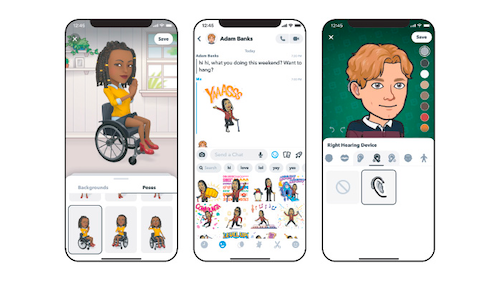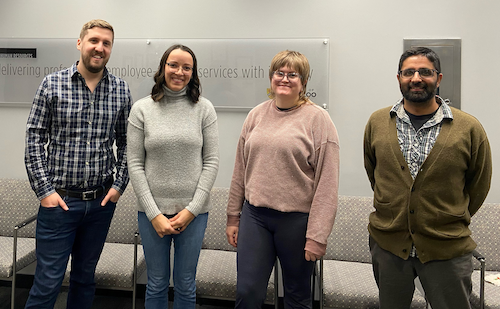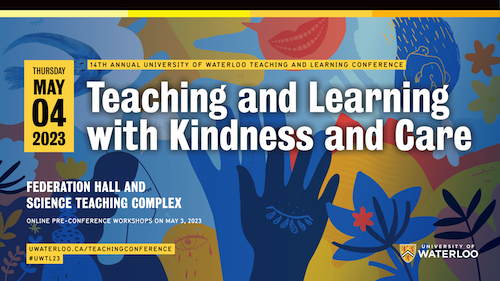The Daily Bulletin is published by Internal and Leadership Communications, part of University Communications
Contact us at bulletin@uwaterloo.ca
Submission guidelines
Editor:
Brandon Sweet
University Communications
bulletin@uwaterloo.ca

By Jon Parsons. This article was originally published in the Fall 2022 issue of Waterloo Magazine.
Among the great liberating qualities of the digital world is that it allows many people to express themselves, free from the constraints of the physical world.
 For David Kennedy (BMath ’02), vice-president and co-founder of the digital avatar company Bitmoji, the ways people represent themselves and identify online should be about empowerment and breaking free of constraints.
For David Kennedy (BMath ’02), vice-president and co-founder of the digital avatar company Bitmoji, the ways people represent themselves and identify online should be about empowerment and breaking free of constraints.
“The genesis of the idea for Bitmoji is that we wanted to fill a gap in digital communication,” Kennedy said. “That gap is you. The people that you send messages to are the most important people in your life. What Bitmoji does is it actually puts you into those messages. It makes you feel closer to the people you are communicating with.”
Now with more than one billion avatars created, Bitmoji is used across a variety of platforms and is part of the company Snap, the popular social media and camera company. Bitmoji allows users to personalize every aspect of their avatar, and of their online identity, including hair, outfits and skin tone. The avatar can be used in many digital spaces and a new feature even brings the avatars into 3D spaces and augmented reality.
“Our core values are grounded in inclusivity and diversity,” Kennedy said. “Representation matters. Being seen matters. That’s something we have to honour for our users. One of the amazing things about Bitmoji is how passionate our users are and how much feedback we get from them. We want people to be able to fully represent themselves, so when we launch these new avatar traits and accessibility devices, it’s clear to see the impact it has on people.”

These same values are embedded in Snap’s annual corporate social responsibility reports, which they aptly call their CitizenSnap Report.
“Another aspect of Bitmoji, and something that not a lot of people know, is that it was founded in Canada and remains primarily located in Canada,” Kennedy continued. “We have our main Bitmoji offices in Toronto and maintain close connections with Waterloo.”
The company regularly takes on interns and co-op students from the University of Waterloo. Kennedy completed a degree in the Faculty of Mathematics, with a specialization in computer science. He also completed a minor in philosophy and was particularly interested in cognitive science.
“The thing that stands out for me about Waterloo and the impact it had on me was that it taught me resilience,” Kennedy said. “Many courses pushed me outside my comfort zone and helped me build new skills. It’s the same with a startup — you need to be willing to struggle and you need to be persistent.”
After 15 years in the business and with Bitmoji having recently crossed the milestone of having more than one billion Bitmoji avatars created, Kennedy is anything but complacent.
“The physical world has so many constraints on people. Our goal is to make sure we don’t recreate those constraints in the digital world, and that inspires our work every day.”

This article was originally published on Waterloo News.
Researchers at the University of Waterloo have created a computational model to predict the growth of deadly brain tumours more accurately.
Glioblastoma multiforme (GBM) is a brain cancer with an average survival rate of only one year. It is difficult to treat due to its extremely dense core, rapid growth, and location in the brain. Estimating these tumours’ diffusivity and proliferation rate is useful for clinicians, but that information is hard to predict for an individual patient quickly and accurately.
Researchers at the University of Waterloo and the University of Toronto have partnered with St. Michael’s Hospital in Toronto to analyze MRI data from multiple GBM sufferers. They’re using machine learning to fully analyze a patient’s tumour, to better predict cancer progression.
Researchers analyzed two sets of MRIs from each of five anonymous patients suffering from GBM. The patients underwent extensive MRIs, waited several months, and then received a second set of MRIs. Because these patients, for undisclosed reasons, chose not to receive any treatment or intervention during this time, their MRIs provided the scientists with a unique opportunity to understand how GBM grows when left unchecked.
The researchers used a deep learning model to turn the MRI data into patient-specific parameter estimates that inform a predictive model for GBM growth. This technique was applied to patients’ and synthetic tumours, for which the true characteristics were known, enabling them to validate the model.
“We would have loved to do this analysis on a huge data set,” said Cameron Meaney, a PhD candidate in Applied Mathematics and the study’s lead researcher. “Based on the nature of the illness, however, that’s very challenging because there isn’t a long life expectancy, and people tend to start treatment. That’s why the opportunity to compare five untreated tumours was so rare – and valuable.”
Now that the scientists have a good model of how GBM grows untreated, their next step is to expand the model to include the effect of treatment on the tumours. Then the data set would increase from a handful of MRIs to thousands.
Meaney emphasizes that access to MRI data – and partnership between mathematicians and clinicians – can have huge impacts on patients going forward.
“The integration of quantitative analysis into healthcare is the future,” Meaney said.
The study, Deep Learning Characterization of Brain Tumours With Diffusion Weighted Imaging, co-authored by Meaney, Sunit Das, Errol Colak, and Mohammad Kohandel, appears in the Journal of Theoretical Biology.

Spencer Small, Edita Gatchene, Leanne Racicot, and Nadeem Lawji.
The Office of the Chief Human Resources Officer is please to announce that five members of the University of Waterloo staff have been chosen to receive the Staff Enhancement Experience (SEE) Canada grant for 2022/23. The SEE Canada Grant provides an opportunity for regular full-time University staff members to further their professional development through idea-exchange and learning alongside counterparts at other Canadian universities, colleges, research institutions or industry-partner organizations.
“It is wonderful to have the SEE Canada Grant return after the two-year hiatus and provide this wonderful development opportunity for staff to learn from partners across Canada to enrich our community as a whole,” says Michelle Hollis, interim Chief Human Resources Officer.
The SEE Canada Selection Committee has chosen the following recipients for 2022:
The recipients will be travelling over the winter term as part of their professional development experience.
The revised Policy 30: Employment of Graduate Student Teaching Assistants has received provostial approval and was made effective in December 2022, according to a memo sent by Jeff Casello, Associate Vice-President, Graduate and Postdoctoral Affairs to graduate students earlier this week.
"As shared with the University of Waterloo Senate on January 16, 2023, the Policy was jointly drafted over several years by a very collegial and productive committee comprised of many graduate students and various university administrators," says Dr. Casello's memo. "The Policy was greatly improved through multiple consultations with student groups, most notably the Graduate Student Association – University of Waterloo (GSA-UW), as well as our Faculties and academic support units."
"Overall, you will note that the Policy is predicated on the creation of collegial and respectful relationships between Instructors, Graduate Teaching Assistants (GTAs), and the administrators responsible for overseeing TA appointments. The Policy also acknowledges the concurrent roles of GTAs who, while TAing are supporting the University’s educational mission, continue to pursue their own academics."
Highlights of the updated Policy include the following:
"For the full policy document, including appendices, I encourage you to visit the Secretariat’s website: Policy 30: Employment of Graduate student Teaching Assistants (TA)," Casello's memo continues. "I would like to take this opportunity to thank the drafting committee members, which included staff, graduate students, and faculty members. I am pleased that through our collective efforts, we were able to create a policy that benefits graduate students and the University alike, and that supports the delivery of the University’s academic mission while acknowledging the diversity of responsibilities that our graduate students hold while serving as a TA. The Policy is in effect now; all Faculties will be working with their staff, faculty, and students to have a transparent rollout of the GTA appointment process in full effect by fall 2023."
"As always, I welcome your input – feel free to email me: gspa-avp@uwaterloo.ca," Casello concludes. "Thank you for your support."

The deadline to submit a proposal for the University of Waterloo’s Annual Teaching and Learning Conference, taking place Thursday, May 4, 2023, is Wednesday, January 25. The 2023 conference theme is “Teaching and Learning with Kindness and Care”. We invite you to submit proposals for presentations, panel discussions, workshops, poster presentations, and a teaching and learning showcase. "New this year, we also invite proposals submissions for pre-conference workshops which will be held online prior to the conference on Wednesday, May 3, 2023," says a note from the conference organizers.
For more information check out the Call for Proposals website.
Waterloo International is calling on interested faculty and staff members to apply for an opportunity to participate in an Erasmus+ Teaching/Training Mobility experience at the Charles III University of Madrid. This opportunity involves a 5-day experience for one staff or faculty member to be taken before July 31, 2023. The deadline to apply is February 3, 2023.

On Sunday, January 22, people on the Waterloo campus and around the world will be celebrating the Year of the Rabbit on the traditional Chinese lunar calendar. The lunar new year, which is also known as “Chinese New Year” or “Spring Festival” depending where you are and who you're with, features traditional observances that take place over 15 days of celebration, ending with the Lantern Festival on Sunday, February 5.
Celebrations on campus include an event at Renison University College today at 11:00 a.m. in the college atrium involving food and fun, and an event at DC Bytes featuring lion dancers at 12 noon on Wednesday, January 25.
The Rabbit is the fourth in the twelve-year Chinese Zodiac cycle, and in traditional Chinese astrology is closely connected to the Moon. It should be noted that Vietnam is celebrating the Year of the Cat.
Locally, the Lunar New Year is among the holidays that Waterloo's city council has included in its fireworks bylaw, alongside Canada Day, Victoria Day, and Diwali. Observers are permitted to set off fireworks one day before and after the holiday, with a time limit of 11:00 p.m.
And so, on behalf of the Daily Bulletin: Xīn nián kuài lè (Mandarin for “happy new year”) and Gong hei fat choy (Cantonese for “wishing you great happiness and prosperity”).
Students can visit the Student Success Office online for supports including academic development, international student resources, immigration consulting, leadership development, exchange and study abroad, and opportunities to get involved.
Instructors looking for targeted support for developing online components for blended learning courses, transitioning remote to fully online courses, revising current online courses, and more please visit Agile Development | Centre for Extended Learning | University of Waterloo (uwaterloo.ca).
Faculty, staff, post-doc and graduate student instructors can find upcoming teaching and learning workshops, self-directed modules and recordings of previous events on Centre for Teaching Excellence Workshops and Events page.
Instructors can access the EdTech Hub to find support on Waterloo’s centrally supported EdTech tools. The Hub is supported by members of IST’s Instructional Technologies and Media Services, Centre for Teaching Excellence, Centre for Extended Learning and subject matter experts from other campus areas.
Supports are available for employees returning to campus. Visit IST’s Hybrid Work and Technology guidelines and workplace protocols to assist with the transition.
Students with permanent, temporary and suspected disabilities and disabling conditions (medical conditions, injuries, or trauma from discrimination, violence, or oppression) can register with AccessAbility Services for academic accommodations (classroom accommodations, testing accommodations, milestone accommodations).
Instructors can visit AccessAbility Services' Faculty and Staff web page for information about the Instructor/Faculty role in the accommodation process. Instructors/Faculty members are legally required to accommodate students with disabilities. AccessAbility Services (AAS) is here to help you understand your obligations, and to offer services and resources to help you facilitate accommodations.
The Writing and Communication Centre has in-person and virtual services to support grad and undergrad students, postdocs and faculty with any writing or communication project. Services include one-to-one appointments, drop-ins at Dana Porter Library, online workshops, writing groups, English conversation practice, and custom in-class workshops.
Research Ethics: Find yourself with an ethical question, unsure if your work requires an ethics review, or need advice about putting together a research ethics application? Reach out to one of our friendly staff by booking a consultation or email us with your questions.
Co-op students can get help finding a job and find supports to successfully work remotely, develop new skills, access wellness and career information, and contact a co-op or career advisor.
The Centre for Career Action (CCA) has services and programs to support undergrads, grad students, postdocs, alumni, and employees in figuring out what they value, what they’re good at, and how to access meaningful work, co-op, volunteer, or graduate/professional school opportunities. Questions about CCA's services? Live chat, call 519-888-4047, or stop by our front desk in the Tatham Centre 8:30 a.m. to 4:30 p.m., Monday to Friday.
Drop-in to in-person Warrior Study Halls on Thursdays from 5:00 p.m. to 6:30 p.m. in DC and DP. Join a Peer Success Coach to set goals and work independently or in groups each week.
Renison's English Language Institute continues to offer virtual events and workshops to help students practice their English language skills.
If you feel overwhelmed or anxious and need to talk to somebody, please contact the University’s Campus Wellness services, either Health Services or Counselling Services. You can also contact the University's Centre for Mental Health Research and Treatment. Good2Talk is a post-secondary student helpline available to all students.
The Library is here to help, both in person and online. Our spaces are open for access to book stacks, study space, computers and printers, and the IST Help Desk. For in-depth support, meet one-to-one with Librarians, Special Collections & Archives and Geospatial Centre staff. Access our resources online for anywhere, anytime learning and research. Full details on current services and hours are available on the Library’s COVID-19 Update webpage.
The Faculty Association of the University of Waterloo (FAUW) continues to advocate for its members. Check out the FAUW blog for more information.
The University of Waterloo Staff Association (UWSA) continues to advocate for its members. Check out the UWSA blog for more information.
The Office of Equity, Diversity, Inclusion & Anti-Racism (EDI-R) works with students, faculty and staff across campus to advance equity and Anti-racism through evidence-based policies, practices and programs. If you have a concern related to Anti-racism and/or equity, please complete our intake form.
The Sexual Violence Prevention and Response Office (SVPRO) supports all members of the University of Waterloo campus community who have experienced, or been impacted, by sexual violence. This includes all students, staff, faculty and visitors on the main campus, the satellite campuses, and at the affiliated and federated Waterloo Institutes and Colleges. For support, email: svpro@uwaterloo.ca or visit the SVPRO website.
The Office of Indigenous Relations is a central hub that provides guidance, support, and resources to all Indigenous and non-Indigenous campus community members and oversees the University's Indigenization strategy.
The Waterloo Indigenous Student Centre, based at United College, provides support and resources for Indigenous students, and educational outreach programs for the broader community, including lectures, and events.
WUSA supports for students:
Peer support - MATES, Glow Centre, RAISE, Women’s Centre - Click on one of the links to book an appointment either in person or online for the term.
Food Support Service food hampers are currently available from the Turnkey Desk 24/7 in the Student Life Centre. Drop-off locations are also open again in SLC, DC, DP, SCH, and all residences.
Co-op Connection all available online.
Centre for Academic Policy Support - CAPS is here to assist Waterloo undergraduates throughout their experience in navigating academic policy in the instances of filing petitions, grievances and appeals. Please contact them at caps@wusa.ca.
WUSA Student Legal Protection Program - Seeking legal counsel can be intimidating, especially if it’s your first time facing a legal issue. The legal assistance helpline provides quick access to legal advice in any area of law, including criminal. Just call 1-833-202-4571.
Empower Me is a confidential mental health and wellness service that connects students with qualified counsellors 24/7. They can be reached at 1-833-628-5589.
GSA-UW supports for graduate students:
The Graduate Student Association (GSA-UW) supports students’ academic and social experience and promotes their well-being.
Advising and Support - The GSA advises graduate students experiencing challenges and can help with navigating university policies & filing a grievance, appeal, or petition.
Mental Health covered by the Health Plan - The GSA Health Plan now has an 80 per cent coverage rate (up to $800/year) for Mental Health Practitioners. Your plan includes coverage for psychologists, registered social workers, psychotherapists, and clinical counselors.
Dental Care - The GSA Dental Plan covers 60 to 70 per cent of your dental costs and by visiting dental professionals who are members of the Studentcare Networks, you can receive an additional 20 to 30 per cent coverage.
Student Legal Protection Program - Your GSA fees give you access to unlimited legal advice, accessible via a toll-free helpline: +1-833-202-4571. This advice covers topics including housing disputes, employment disputes, and disputes with an academic institution.
The Graduate House: Open Monday to Tuesday 11:30 a.m. to 7:00 p.m. and Wednesday to Friday 11:30 a.m. to 9:00 p.m. We’re open to all students, faculty, staff, and community members. The Graduate House is a community space run by the GSA-UW. We’re adding new items to the menu. Graduate students who paid their fees can get discounts and free coffee.
Warriors Game Day Tickets and Season Passes, on sale now. Cheer on your Warriors W/M Basketball, Football W/M Hockey and W/M Volleyball teams at home during the 2022-23 season. Purchase today.
Fitness and Personal Training - Registrations opened January 5 this winter with Personal Training and Small Group Training as well as a Free Warrior Workout Program.
Knowledge Integration seminar: “Future Cities”, featuring speaker Marta Berbés-Blázquez, Caivan Communities Assistant Professor, School of Planning and the Faculty of Environment, Friday, January 20, 2:30 p.m., EV3-1408.
Canadian Graduate Quantum Conference, Tuesday, January 24, Mike & Ophelia Lazaridis Quantum-Nano Centre.
NEW - Master of Business, Entrepreneurship and Technology (MBET) Information Session, Tuesday, January 24, 5:00 p.m. to 6:00 p.m., online.
Research Talks, “The AI Tsunami – Where will it take us?” Tuesday, January 24, 6:00 p.m. to 8:00 p.m., Jobsite Brewing Co., 45 Cambria Street, Stratford, Ontario. Registration is required as seating is limited.
Noon Hour Concert: The Virtuosic Violin, Bach, Waxman & More, Wednesday, January 25, 12:30 p.m. to 1:30 p.m., Conrad Grebel Chapel.
NEW - WIN Thematic Seminar: Quantum-dot Light Emitting Devices: Addressing the Electroluminescence Stability Challenge for a Bright Future, Wednesday, January 25, 12 noon to 1:00 p.m., QNC 1501.
Deadline to register for Centre for Extended Learning (CEL) "Getting Ready to Facilitate Online Courses: TA Training – Winter 2023" course, Monday, January 30.
2SLGBTQ+ Fundamentals, Tuesday, January 31, 10:00 a.m. to 12 noon, online.
The Daily Bulletin is published by Internal and Leadership Communications, part of University Communications
Contact us at bulletin@uwaterloo.ca
Submission guidelines
The University of Waterloo acknowledges that much of our work takes place on the traditional territory of the Neutral, Anishinaabeg, and Haudenosaunee peoples. Our main campus is situated on the Haldimand Tract, the land granted to the Six Nations that includes six miles on each side of the Grand River. Our active work toward reconciliation takes place across our campuses through research, learning, teaching, and community building, and is co-ordinated within the Office of Indigenous Relations.